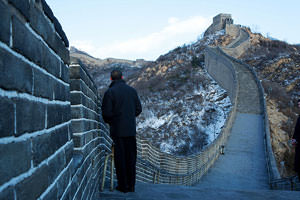Why Does Obama Suddenly Want a War With China?
One might think that a bitter Central Asian war in Afghanistan and an ambiguous commitment to Iraq would be enough for President Barack Obama to cope with.
One might think that a bitter Central Asian war in Afghanistan, spilling into Pakistan, with no sign of ending, and an as yet ambiguous military commitment to a defeated and incompletely reconstituted Iraq, now overshadowed by Iran and the Arab Awakening across the Middle East, would be enough for President Barack Obama to cope with.
He was, after all, elected to reduce American military commitments. He was going to end things in Iraq, fight the “right war” in Afghanistan, which Gen. David Petraeus told him could be wound up in a year. Unaccustomed to generals as he might have been, he surely did not expect “Af-Pak” to turn into a permanent activity and a source of income for the Pentagon and the American arms industry.
Why then does he now want a war with China? No one seems to have made much of this in American press reports and comment, but others have noticed, most of all in China. His journey to Asia this month proclaimed a Pax Americana for Asia — which as such is absurd. The effort is likely to become just the opposite: a steadily deepening and costly engagement in suppressing China’s attempt to reclaim the Asian preeminence it held for more than a thousand years.
This is the sort of thing that starts world wars. Think of Hohenzollern, Germany, challenging British sea power before 1914. Think of Japan’s long and bloody effort to make itself Asia’s imperial power. Think of what it took for Napoleon to conquer Europe and much of the Mediterranean, and then what it took Britain, Russia, Spanish guerrilla-peasants, and assorted others to wear down and defeat Napoleon. The lesson is: Don’t start wars with powers being driven by revolutionary enthusiasm or nationalism to claim — or reclaim — a place in the sun.
What is at stake between China and the United States? We are on the opposite sides of the world with next to nothing to fight about, except raw materials — of which there still is a good deal available for all. Industrial domination of the world? What does that actually mean, and what is it worth? Bragging rights about who is top nation? That’s what Washington seems to care about. If American leaders push that too far, they could end in a war that eliminates both from the competition.
The Spratly Islands? The message Barack Obama delivered to Asia, first in Indonesia in mid-November while attending the political conference organized to accompany an ASEAN (Association of Southeast Asian Nations) conference, and subsequently at a bilateral meeting with the Australian government, was a double-barreled warning by the United States to China.
This message said that the United States now considers itself a permanent Pacific and Asian power. Just as it settled in long ago as an unofficial permanent European power (the ally who wouldn’t go home), it now is permanently Asian, and anything that happens in the Pacific and the Far East automatically will concern Americans.
The specific meaning of this message, as directed to Beijing, was that matters officially considered by China to be local or regional in nature, and meant to be solved directly by one-to-one negotiations between China and its neighbors, are now considered by the United States to be America’s affair too. (We are talking here about islands in the South China Sea, possible sites of energy and other resources, to which rival claims are made by China, Vietnam, the Philippines, Brunei, Malaysia, and Taiwan, and also the Senkaku Islands held by Japan but claimed by China and Taiwan.) There is, in addition, the Taiwan issue itself, which China considers a rebel province, and Taiwan disagrees.
The president then went on to Canberra and signed an agreement with Australia to station 2,500 U.S. Marines in Australia’s Northern Territory (closest to mainland Asia). He said to the Australian Parliament that the United States is shifting its military weight from the Middle East to the Pacific, declaring in one of those “Let there be no doubt” phrases habitual to American presidents that “in the Asia Pacific in the 21st century, the United States of America is all in.”
Are we Americans really sure that we want to be “all in”? All in what? A war over China’s claims on Taiwan and the South China Sea? Or over access to “rare earths”? Or over — as just might happen — a China reduced to ruins by revolutionary upheaval? Or, are Mr. Obama and the Washington elite looking for distraction from our own revolutionary unrest?
Visit William Pfaff’s website for more on his latest book, “The Irony of Manifest Destiny: The Tragedy of America’s Foreign Policy” (Walker & Co., $25), at www.williampfaff.com.
© 2011 Tribune Media Services, Inc.
Your support matters…Independent journalism is under threat and overshadowed by heavily funded mainstream media.
You can help level the playing field. Become a member.
Your tax-deductible contribution keeps us digging beneath the headlines to give you thought-provoking, investigative reporting and analysis that unearths what's really happening- without compromise.
Give today to support our courageous, independent journalists.






You need to be a supporter to comment.
There are currently no responses to this article.
Be the first to respond.